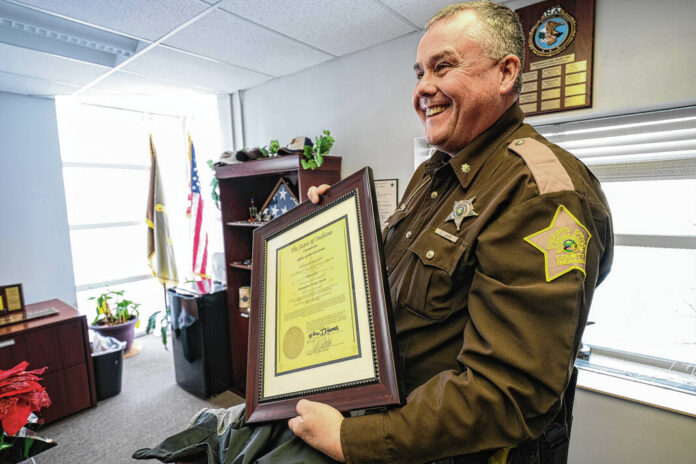
Mike Wolanin | The Republic Bartholomew County Sheriff-elect Chris Lane shows the State of Indiana Commission for being elected sheriff from Gov. Eric Holcomb in his office at the Bartholomew County Sheriff’s Office in Columbus, Ind., Tuesday, Dec. 27, 2022.
A new sheriff takes over in Bartholomew County on Sunday, and he’s well known throughout the community for his work as chief deputy for the past eight years.
“I’ve been a good #2 man,” said soon-to-be Bartholomew County Sheriff Chris Lane. “But there’s a lot of difference between going from the #2 man to being the boss in the corner office.”
Current Sheriff Matt Myers, who has announced he is seeking the Republican nomination for Columbus mayor in 2023, was term-limited by state law from running for sheriff for a third time.
“I think I’ve groomed myself for this position by all the different things I’ve been involved in over the last 30 years,” Lane said. “In the last eight years, being embedded at the sheriff’s department and being part of everything that has been going on has put me in a good position to be the sheriff.”
Myers will stay with the sheriff’s department for another two months to help with the transition. By working at least an additional month after stepping down as sheriff, Myers — a retired Columbus Police Department lieutenant — will be ensured pensions from both the city and county when he retires.
Lane outlined five priorities as he takes office, including relentless drug enforcement, efficiency and innovation, employee retention, mental and physical resilience and partnerships with other agencies.
The new sheriff promised that those with jail who suffer from substance abuse disorder who sincerely want to change and lead a sober, crime-free life will find help, possibly through the BART (“Begin, Accept, Reveal, Transform) drug treatment program at the jail.
In addition, he plans to focus on working with groups such as the Alliance for Substance Abuse Progress (ASAP) and Columbus Regional Hospital as providing treatment services is in everyone’s best interest, Lane said. He was instrumental in setting up and operating the drug treatment program in the Bartholomew County Jail.
Lane is aware that many in the community feel no mercy should be given to drug dealers.
“Lock them up and throw away the key?” Lane asked. “That’s been tried since the Nixon administration in the 1970s. All you get are higher incarceration rates, fill up more prisons and spend huge amounts of money.”
Offering treatment doesn’t mean those who commit drug-related crime won’t be held accountable for their actions, Lane said.
”I am in the business of law enforcement,” the sheriff said. “Every addict has family and loved ones. We owe them an obligation to do everything we can to hold drug dealers accountable.”
What is particularly troubling to Lane is the synthetic opioid fentanyl, which is often mixed with methamphetamine or other unknown items which has led to a skyrocketing number of overdoses.
As of Thursday there had been 39 confirmed overdose deaths in Bartholomew County this year, the highest annual total on record. Most came from a combination of methamphetamine and fentanyl that Lane says resembles a Xanax pill.
“If these pills are bought on the street, the person has no clue on what they are getting,” Lane said.
According to the Indiana Department of Health, 2,554 Hoosiers died of drug overdoses in 2021 and over 70% of the deaths were caused by fentanyl and other synthetic opioids. Between January 1 and August 1, 2022, more than 2,500 Hoosiers have been lost to drug overdoses, the vast majority from fentanyl and similar drugs.
“And they can buy it online,” Lane said. “That makes it even scarier.”
Lane said the department will continue to have a deputy assigned full-time as a member of a federal drug task force. In addition, the Joint Narcotics Enforcement Team (JNET) that Myers initiated in early 2015 will continue, he said. JNET is a combined unit of the Bartholomew County Sheriff’s Office and the Columbus Police Department. Former deputy prosecutor Greg Long had been part of the team, but he no longer works in the prosecutor’s office.
He has also had discussions with Bartholomew County Prosecutor-elect Lindsey Holden-Kay about how they can best work together.
“Lindsey is definitely going to be a breath of fresh air for law enforcement,” Lane said.
Lane credits JNET, as well as cooperation between multiple agencies in different states, to the successful “Operation Columbus Day,” a three-year long drug investigation centered in Columbus that resulted in the May, 2021 dismantling of a nationwide drug trafficking network.
Efficiency and innovation
In essence, the sheriff runs a $12 million tax-supported business, Lane said. The responsibilities have a lot of moving parts that include patrol division, jail, Bartholomew County Courthouse security and drug treatment.
One potential change being considered includes using FaceTime to file reports on minor crimes. This addresses the fact that as few as four or five patrolling deputies might be assigned to a shift to handle 400 square miles of land and more than 700 miles of rural roads, Lane said.
Under Myers’ leadership, innovative programs like JNET and obtaining body and car cameras became reality. Lane also credits Myers for increasing training for merit deputies and improving morale.
Other innovations include the $76,265 spent earlier this year on purchasing four drones for deputies, as well as mapping software, training and drone flying authorization clearances. The new equipment allows crash investigators to use geographical scanners and other equipment to recreate crashes away from the accident site, which allows a shorter waiting time for backed-up traffic.
“Twenty years ago, that technology wasn’t there, so you didn’t have that expectation,” Lane said. “Now, it’s equipment that we need. It’s now expected when we have to present a case to the prosecutor.”
The department will also continue to support an intelligence-led policing group, which is a practice that leverages technological advances in both data collection and analytics to generate valuable “intelligence” to more efficiently use resources where they are likely to do the most good. They will also continue to work with Dana Vogt, a Cummins Inc. efficiency expert who has volunteered his services to the sheriff’s department for several years.
Employee retention
The sheriff’s office is not alone in having difficulty in finding employees. When the Bartholomew County Jail is down 10 to 15 correction officers as it is now, it forces corrections officers to work mandatory overtime, which leads to an eventual burnout, Lane said.
“It’s just a revolving door that affects our ability to do everything else,” Lane said. ” You have all these moving parts that can be used to fill a hole in the dike. But if you stick your finger in one hole, you have two more leaks that pop up elsewhere.”
After hiring a new deputy, it could take 14 months for the recruit to graduate from the Indiana Law Enforcement Academy and put in nearly a year of field training before they are allowed out on their own.
There’s also a recruiting problem. When Lane was hired by the Columbus Police Department in 1991, more than 300 applicants competed for six positions. But now, CPD and our department receive about one-third of the applications they took over 20 years ago, he said, adding it’s not just a local problem, but a state and national issue.
There were only 23 candidates in the last Indiana State Police recruitment class, making it the smallest since 1946.
“It’s not what we are doing, it’s society.” Lane said. “Folks see they can make better money in the private sector.”
Lane says he has obtained a list of several contacts and resources he plans to tap in order to learn what others are doing to handle their personnel shortages.
While most people look at wages and benefits as the way to keep employees, Lane said a sheriff must provide those under his command with balance in their lives. That includes insisting they take days off, and spend time with the family, he explained. Maintaining a balanced life provides mental and physical resilience, Lane said.
“When I went to the FBI National Academy, it was a hot topic,” Lane said. “Law enforcement has a suicide rate that rises annually and is now going through the roof. Why is that? As leaders, we need to do a better job of taking care of our people.”
The job can also cause mental trauma. After a deputy responds to multiple fatality crashes, as well as severe physical abuse and overdose deaths, they can find themselves with horrific images in their heads that they can’t escape, Lane said.
While applicants are being considered for a position, they are required to take a psychological evaluation. But that person might be on the department for up to 20 years without taking another psychological test, the new sheriff said.
Although many officers consider mental health counseling a sign of weakness, Lane insists it is not.
“If I don’t take care of my staff, how are they going to take care of the citizens?” he asked.
Partnerships
While some officers feel that asking help from another agencies is also a sign of weakness, Lane said he always follows his father’s advice to never lose the contacts he makes in his career.
”I still have contacts from when I worked in narcotics,” Lane said. “Many of them have worked their way up the chain of command, so since they are in positions of power, I call them to ask what it will take to make something happen.”
Over the past eight years, the sheriff’s office has developed resources that other sheriff offices don’t have, Lane said. Some of the more sophisticated tools the deputies use were purchased with drug seizure money, he explained.
”I’ve told everyone if you need help, we’ll help you,” Lane said. “ They may someday be able to help me on something I need.“
After law enforcement officers get used to joint cooperation with other agencies, it gets easier because everybody knows what they have to do, Lane said.
Chris Lane
Occupation: Bartholomew County Sheriff-elect
Age: 54
Hometown: Paoli in Orange County
Education: Studied law enforcement at Vincennes University, followed by studying Criminal Justice at Indiana University. While still a student in Bloomington, Lane went through the Indiana Law Enforcement Academy. Graduated in 2019 from the FBI National Academy in Quantico, Virginia.
Professional experience: Worked with the IU Campus Police until he was hired by the Columbus Police Department, where he worked from December 1991 through September 2012. Retired with the rank of captain. Worked two years as a representative of the Indiana Gaming Commission at the French Lick Casino. Chosen in late 2014 by newly-elected Bartholomew County Sheriff Matt Myers to be chief deputy. Began his new job in January 2015 with the rank of Major.
Specialties: Administrator, head of detectives, firearms instructor, undercover narcotics detective.
Family: wife, Connie. Two adult sons, David and Blake.




